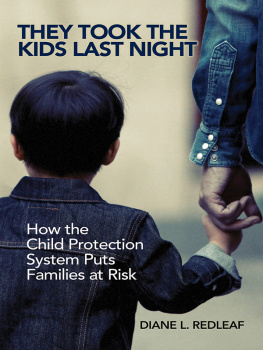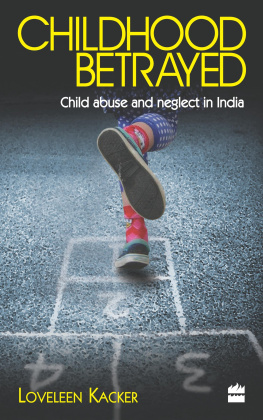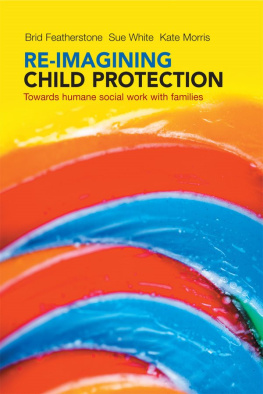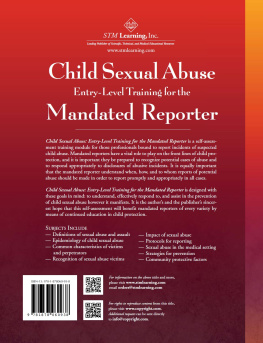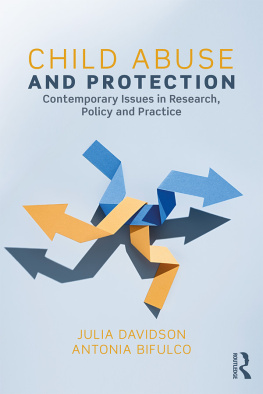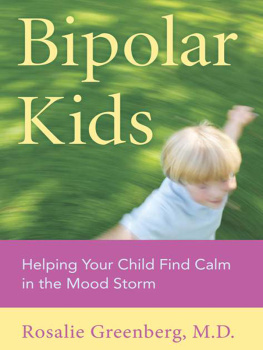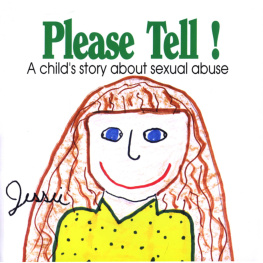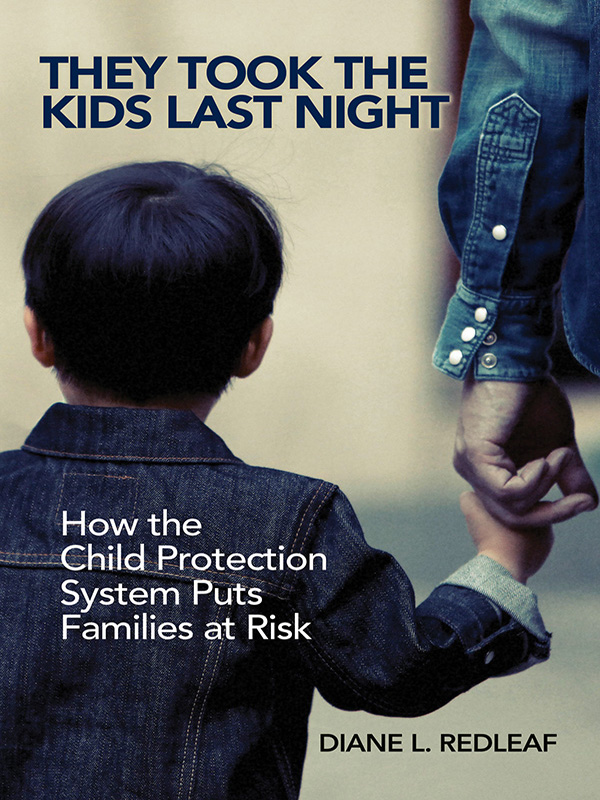They Took the Kids Last Night
Copyright 2018 by Diane L. Redleaf
All rights reserved. No part of this publication may be reproduced, stored in a retrieval system, or transmitted, in any form or by any means, electronic, mechanical, photocopying, recording, or otherwise, except for the inclusion of brief quotations in a review, without prior permission in writing from the publisher.
Library of Congress Cataloging-in-Publication Data
Names: Redleaf, Diane L., author.
Title: They took the kids last night : how the child protection system puts families at risk / Diane L. Redleaf.
Description: Santa Barbara, California : Praeger, [2018] | Includes bibliographical references and index.
Identifiers: LCCN 2018023512 (print) | LCCN 2018024434 (ebook) | ISBN 9781440866296 (eBook) | ISBN 9781440866289 (hardcopy : alk. paper)
Subjects: | MESH: Child Protective Services | Child Abuselegislation & jurisprudence | Family Relations | Mandatory Reporting | Civil Rights | Illinois
Classification: LCC HV6626.5 (ebook) | LCC HV6626.5 (print) | NLM WA 320 AI3 | DDC 362.76dc23
LC record available at https://lccn.loc.gov/2018023512
ISBN: 978-1-4408-6628-9 (print)
978-1-4408-6629-6 (ebook)
22 21 20 19 18 1 2 3 4 5
This book is also available as an eBook.
Praeger
An Imprint of ABC-CLIO, LLC
ABC-CLIO, LLC
130 Cremona Drive, P.O. Box 1911
Santa Barbara, California 93116-1911
www.abc-clio.com
This book is printed on acid-free paper 
Manufactured in the United States of America
To the families, colleagues, supporters, and allies with whom I have been privileged to work over many years of advocacy for families in the child welfare system.
To Melissa Staas, whose 10 years of work on the cases presented here forged her outstanding leadership as a family defender and made this book her story too, and to Carolyn Kubitschek, whose brilliance lit the path I have followed.
To my husband, Anatoly Libgober, and my parents, Paul and Rhoda Redleaf, who are a source of support, inspiration, and courage.
To my own children, Brian and Jonathan Libgober, who are my greatest source of joy and my teachers on the meaning of the precious right to raise a family.
Contents
This book comes out of my 38 years of practice as a lawyer in Chicago, 33 of which have focused on the Illinois child protective services (CPS) system. While Illinois system, like each states, has its own peculiarities, Ive tried to make this book as generic as I can. Cases like the ones I talk about happen in every state, for child abuse hotlines have been federally mandated since 1974. But each state has its own statutes, rules, policies, and practices, so readers must be aware that this books descriptions may not strictly translate to the way things are done in another state. This book is no substitute for specific legal advice or guidance.
Ive had a front-row seat and sometimes been in the drivers seat in the reform efforts this book discusses. Ive been a part of national, state, and local child protection advocacy for families. In 1984, Chicagos largest legal services agency, the Legal Assistance Foundation, allowed me to start a child advocacy project. I wanted only to represent children, not their allegedly abusive parents. It took just one first case to turn me around. Ive been a family defender ever since.
That case involved two sisters, a 10-year-old and a 13-year-old. The older sister alleged that her stepfather had fondled her. Both girls were removed from their home. A disabled younger brother was left at home, not because the State believed he was safe but because the State had no available foster homes for his special needs. When the mother sought my help, she had lost contact with her 10-year-old daughter after the child had repeatedly run home from successive foster homes. Eventually, the child was placed into a residential facility, Maryville, far from her family in Chicago. While the mother was a monolingual Spanish speaker, none of the facilitys staff spoke Spanish and so no one had called the family to let them know the girl was all right. At this point, the mother had already endured a month of no contact with the girl.
After a few phone calls to CPS officials, I found the girl. I drove her family out to see her at Maryville. It was a joyous reunion, so I vowed to help the family reunite permanently. The 10-year-old girl said that nothing inappropriate had happened to her and that she longed to be back home. When I prepared the girl to testify in the Cook County Juvenile Court, I focused some initial witness-qualifying questions on her understanding of the judges role. In our prep session, she answered well: a judge, she said, was someone who listens and makes a decision after hearing from everyone. But when her case came into court, the judge refused to let the girl testify. He dismissed out of hand my request to return her home. I watched a little girls view of justice dim before my eyes.
A few weeks later, however, the State dropped its case against the mother, and suddenly the children went home. The State had no evidence showing the mother had failed to protect her 13-year-old daughter. The 13-year-old waffled about what had happened, too. I concluded that while the mother was quite powerless, it was her perceived guilt or innocence that mattered to the court. But her legal representation had been, if anything, less vigorous than the childrens. Her court-appointed lawyer didnt make any of the arguments that needed to be made.
This first case of mine taught me why child advocates need to defend familiesnot at all costs but vigorously and effectively. Im not naive. Some parents commit terrible abuse. Some child abuse cases are notoriously difficult to figure out. Sexual abuse cases, like this first case of mine, almost always turn on whom you believe. This book steers clear of sexual abuse cases. It focuses, instead, on cases in which the children are brought into the child welfare system solely because of an unexplained injury or a symptom that might be due to either child abuse or an accident or a medical condition. These stories are easy for those who never have encountered CPS themselves to appreciate, since no family is immune from a childhood accident that could be misinterpreted as child abuse. Its also easy to relate to parents concerns when something mysterious causes their children bleeding, seizures, or a previously undetected fracture.
As this book discusses, there are many more cases of wrongful allegations than commonly touted child abuse statistics suggest. And between innocence and guilt lie a range of parenting mistakes, misjudgments, and misunderstandings that should be addressed through means less drastic than taking the kids one night.
The stories here, coming from my own docket as a lawyer, are meant to provide an up-close and in-depth description of the CPS system in cases where the parents innocence no longer is in any reasonable doubt. Each of the stories involves parents first accused and then eventually exonerated. In the course of taking the kids, CPS systems frequently seem out of control. Lest I be misunderstood on this point, I want to emphasize that I do not advocate keeping children with parents who are genuinely abusive. Nor do I claim that CPS is always in the wrong. Rather, CPS systems need to do a vastly better job of distinguishing heinous abusers from reasonably good parents who deserve protection from the risk of losing their kids one night. If this book generates discussion as to how to better protect loving families from having their children taken one night, it will have served its primary purpose.

